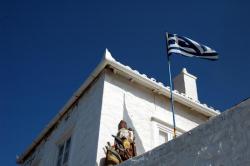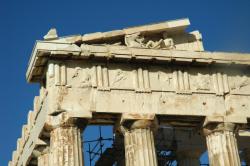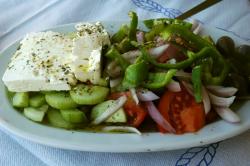Ending up in Greece in the first place was a bit of a surprise to say the least, but consulting threw me another curveball at 8:30 on Wednesday morning. As I’d already finished what I set out to do, how about going to Abu Dhabi instead — today? Well, umm, err, why not?
So I spent the morning trying to figure out how to get there, booking flights and hotels and packing up and checking out two nights ahead of schedule. There were no sensible flight connections from Athens to Abu Dhabi, but I could take a direct flight to Dubai in the evening and cover the remaining 170 km by taxi. The travel agent offered a choice between Olympic, one of Europe’s worst airlines, teetering on the edge of bankruptcy for years with Greece flouting EU rules to subsidize it while unable to find a buyer; and Emirates, one of the world’s best airlines, with enough awards and devoted passengers to make Singapore Airlines quake. It didn’t take too long to decide. (And the Olympic flight, with a Kuwait stopover, would’ve taken longer.)
I took the train out to the airport (“next stop: Pallini”), checked in for my flight, gasped when I saw yet another passport queue of Olympic proportions but was relieved to find it fast-moving, and once through embarked on my perennial pre-flight entertainment ritual of “Find the Power Socket”. After my iPod was juiced up, they started boarding and, smiled in by Emirates stewardesses wearing as much makeup as the Singapore Girls but topped off with pillbox hats and poofy token veils, I navigated to my seat in this B777-300ER. (Incidentally, Emirates’ business class seats look absolutely amazing, but that’ll have to wait for another day.)
First impression: people flying Emirates don’t have just Louis Vuitton handbags, but Louis Vuitton luggage. Second impression: pretty tight seat pitch. Not unusually bad, but by no means generous, and reclining the seat makes it slide forward, reducing the pitch even more. The seat lottery had given me an end aisle, next to the toilets (d’oh), but with nobody behind. This was an advantage, because Emirates’ “ice” entertainment system uses a touchscreen, which means people poking at your headrest when they want to change the channel. (Well, the controller does have a dinky joypad as a substitute, but it’s, well, dinky.) That’s pretty much it as far as negatives go, as the system is otherwise amazing: 500 (!) channels of movies, TV programs and audio, with a nice big screen and a very responsive, high-res interface that slaughters poor old KrisWorld. The handset is in the seat in front, not by your side, which makes it oh so much easier to tweak volumes and channels, and stops you from pressing the wrong buttons by accident to boot. The only downside was that the selection loaded was so un-edgy it hurt: not a single movie I was particularly interested in seeing, no comedy that would qualify as even mildly racy, not even a single DJ mix. Well, at least they had “Best of Ayumi Hamasaki” and the latest by the Chemical Brothers — and there’s another feature that just sold me onto EK for my next long-haul flight: free power sockets for every other seat, even in economy!
Getting permission to leave Elefterios Venizelos took a while, but once in flight dinner, somewhat oddly called “lunch” despite being served at 7 PM, was served. This was pretty impressive: we were handed menus, and while this reduced to “lamb or fish?” when the service actually came around, the actual meal was a cut above the usual: a little plate of Greek mezze, a Greek salad (yay, feta!), and “Perch cooked in spetsiota sauce” which was, well, white fish in tomato sauce. It all looked great though, because — and I know this will sound stupid, but it’s true — the containers were all jauntily sail-shaped or triangular instead of square. Of such small touches is pizzazz made. Dessert was a honey-soaked pastry, the only Arabic-feeling thing on the menu (although the menu claimed that it, too, was Greek) and an on-your-pillow-in-good-hotels piece of chocolate. I was little disappointed/surprised not to have an Arab meal option, but it was still pretty impressive to have a menu so localized for a single destination, and overall it was definitely among the best economy meals I’ve had anywhere.
Dubai Airport is a giant construction site, and we were treated to a long bus journey from the plane with not one, but two stops: one for transiting passengers, the second for those terminating their journey in Dubai. Alas, midnight is peak hour at DXB and there was another long passport queue waiting, but at least this time I’d had the foresight to visit the loo first and 45 minutes passed fairly painlessly. My bag was waiting in the pile next to the conveyor belt, I grabbed a sliver of dirham from an ATM and headed to the taxi queue for my onward journey.
The next 150 km were almost hallucinatory. First lengthwise through the even more fast construction site of Dubai itself, past the towering spire of Burj Dubai, the billowing sail of the Burj al-Arab, the Chinese temples of the Ibn Battuta Mall, and kilometer after kilometer after kilometer of the elevated Dubai Metro track. Eventually, though, the buildings petered out and it was just a ten-lane highway slicing through the desert. An eerie tan light as the streetlamps were filtered through the sandy air, an occasional roar from the left lane as Emiratis speeded past in their tinted-window SUVs at 250 km/h, and at almost every intersection the bulbous, cephalopod figure of an oversized mosque, floodlit green and topped with red lights in the minarets staring out into the desert like eyes. Warning signs posted by the side of the road proclaimed: “Beware of road surprises”.
There are three Hiltons in Abu Dhabi, and the second one my driver took me to was the right one. (Later it turned out that, locationwise, I should’ve booked the first one after all.) After an effortless checkin, I crashed into an opulently huge bed at 3 AM, wondering what awaited me next morning.









